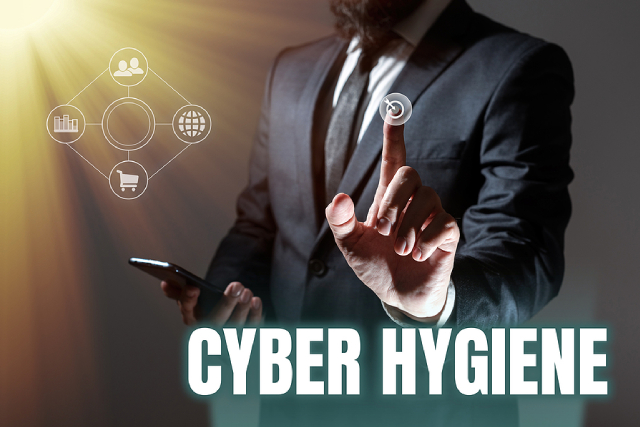- hello@group8.co
- 12 Marina View, Singapore

Our lives – both personal and professional – are increasingly intertwined with the online world, which makes ensuring our cybersecurity is more crucial than ever. From personal information to financial data, we entrust a vast array of sensitive information to the digital realm. However, with the convenience of the internet also comes the risk of cyber threats such as hacking, phishing, malware, and more. That's where cyber hygiene comes into play; it's all about adopting simple yet effective practices to safeguard our digital lives.
Think of cyber hygiene as the digital equivalent of personal hygiene. Just as we brush our teeth and wash our hands to ward off germs and diseases, cyber hygiene involves practices aimed at protecting our digital assets and identities. It encompasses a range of activities, from using strong passwords to keeping software up to date and being cautious about the links we click.
1. Strong passwords
One of the first lines of defence against cyber threats is having strong, unique passwords for each of your online accounts. As such, it would be best to avoid using easily guessable passwords such as ‘password123’, ‘password’, or ‘123456’. Instead, opt for a combination of letters, numbers, and special characters. Consider using passphrases – longer combinations of words or phrases that are easy for you to remember but difficult for others to guess.
This approach not only strengthens your defence against brute force attacks but also mitigates the risk of password spraying attacks, where hackers attempt to gain unauthorised access by trying commonly used passwords across multiple accounts.
2. Two-factor authentication (2FA)
Adding an extra layer of security with 2FA can significantly reduce the risk of unauthorised access to your accounts. Whether it's through authenticator apps, SMS codes, or biometric verification, 2FA provides an additional barrier against hackers by requiring something you know (password) and something you have (a device or code).
3. Regular software updates
Keep your operating system, antivirus software, web browsers, and other applications updated with the latest security patches. Cybercriminals often exploit vulnerabilities in outdated software, so staying up to date is crucial in thwarting their attacks. Additionally, enable automatic updates whenever possible to ensure you're protected against the latest threats.
4. Be wary of phishing attempts
Phishing is a common tactic used by cybercriminals to trick individuals into divulging sensitive information, such as login credentials or financial details. Exercise caution when clicking on links or downloading attachments from unknown sources, and be sceptical of unexpected emails requesting personal information. Look for telltale signs of phishing, such as misspelt URLs, generic greetings, or urgent requests for action.
5. Secure Wi-Fi networks
When connecting to public Wi-Fi networks, be cautious of the potential risks. Avoid accessing sensitive information or making financial transactions over unsecured networks, and consider using a virtual private network (VPN) for added security. When using your home Wi-Fi network, ensure it's protected with a strong password and encryption.
6. Regular backups
In the event of a cyber-attack or data breach, having regular backups of your important files and documents can be a lifesaver. Store backups securely, preferably offline or in encrypted cloud storage, to ensure they're safe from prying eyes. Test your backups regularly to ensure they're functioning correctly and that you can restore your data if needed.
7. Update privacy settings
Review the privacy settings of your social media accounts, email services, and other online platforms regularly. Limit the amount of personal information you share publicly, and adjust privacy settings to restrict access to your profile and posts. Be mindful of the information you provide when creating accounts or filling out online forms, and only share what's necessary.
By incorporating these simple yet effective practices into your digital routine, you can significantly enhance your cybersecurity posture and protect yourself against a variety of cyber threats.
Looking to bolster your cybersecurity even further? Consider partnering with Group8, a leading provider of cybersecurity services in Singapore, including web application firewalls. With our expertise and cutting-edge solutions, you can defend your web applications against a wide range of cyber threats, ensuring peace of mind for you and your customers. Stay safe, stay secure, and embrace the power of cyber hygiene to safeguard your digital world.